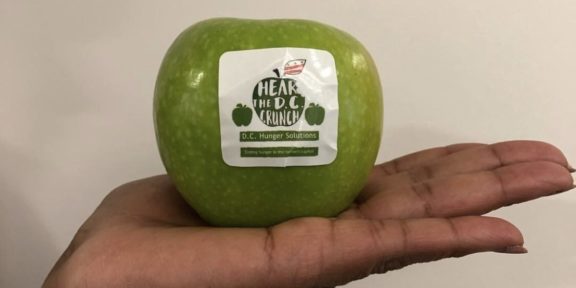Jasmine Hardy, Howard University News Service
Washington, D.C.– Veganism, the practice of abstaining from the use of animal products, particularly in diet, is becoming increasingly popular in the world and the U.S. According to a report by research firm, GlobalData, between 2014 and 2017, there was a 600 percent increase in people identifying as vegans in the U.S. However, there are many people who do not have a choice when it comes to veganism, due to conditions most have never even heard of.

Tommy Ferguson’s diet for as long as he can remember has consisted mainly of fruits, vegetables, potatoes, and a special formula protein shake. No meat, fish, milk, cheese, or anything high in protein was allowed in his household growing up. Now that he’s an adult, a typical meal he likes to make for himself is a portobello mushroom burger. Ferguson, 24, has a very rare metabolic disorder, called phenylketonuria, also known as PKU that makes it nearly impossible to break down protein.
It is one of many inborn errors of metabolism and is a genetic disease, inherited from both parents. PKU interferes with the enzyme that breaks down phenylalanine (PHE), an amino acid that is found in all protein. PHE is a precursor to tyrosine, another amino acid that gets broken down into dopamine, an important neurotransmitter. People with PKU end up having too much PHE and too little tyrosine. Without treatment, this can cause severe intellectual disabilities.
The normal level of PHE in someone’s system is 60, but patients with PKU have a level of 600. This high level of PHE then travels through the blood system and goes straight to the brain, causing severe brain damage leading to retardation, convulsions, and hyperactivity, which results in the need for special care.
PKU is the most frequent metabolic disorder and the one that has been studied for the longest time, according to Dr. Harvey Levy, a position scientist at Boston Children’s Hospital. It can be found in 1 in 15,000 newborns in the U.S. and about 1 in 50 people carry the gene. The disease is almost unknown in people of African descent; it’s more common in people of Irish and European descent.
A famous doctor named Robert Guthrie discovered a special newborn screening in the 1960s for PKU, so that it could be detected right away. With this, the baby could now be put on a special diet that controls their protein and blood levels in order to prevent future brain damage.
For Jill Elkins, she received a call eight days after her twins were born regarding the results of the newborn screening, a call she said she’d never forget. The doctors told her that the screening showed an abnormality for one of the twins. He would need to come in to retake his PHE levels. It was then that she found out he had the rare disorder of PKU.
Elkins, who is now a stay-at-home mom, had no idea that both she and her husband carried the PKU gene. If both parents carry the gene, there is a one in four chance that their child will be born with the disorder. Interestingly, only one of the twins, Hudson, who is now 5 years-old, was born with the disorder. Now Elkins and her husband must balance a lifestyle where one twin must go through life with a severely restricted diet and the other does not.
“Every parent wants their child to feel normal. And having PKU, he is not normal. We call it special in our house. He can’t eat the samples at the store like his sister can. He can’t ever have any of those things that she can,” Elkins said.
Erin Macleod, director of metabolic nutrition at the Children’s National Institute in Washington, D.C. has specifically looked at a new type of formula/ medical food, GMP, or glycol macro peptide, so that kids like Hudson will at least have access to special formula foods that are tasty. GMP is aimed to make the limited diet that young PKU patients in particular are subjected to, more enjoyable.
Previously all special protein formulas for PKU patients were made up of single amino acids. Most protein is bonded in one molecule; however, when you separate the protein and put in a single amino acid, it’s very acidic and has a lot of negative taste properties. MacLeod explained that in Wisconsin, researchers found that the third most abundant protein is whey, which is produced by making cheese (which there’s a lot of in Wisconsin). Then, one of the dairy researchers found that the third most abundant protein in whey is GMP. If you isolate GMP from other proteins in whey it naturally doesn’t have any aeromatic amino acids which PHE is one of. This is why the new formula has more favorable tastes.
“Part of my overall job and philosophy is finding ways to make the restrictive diet as normal as possible for families,” MacLeod said. “I work with families to incorporate the patient’s favorite meal and make them low protein.”
MacLeod said some of her patients have started their own blogs to talk about PKU. Getting a support network in their lives can also help the nutritional process for the parents immensely.
For example, MacLeod has seen grandparents get involved; making low protein bread for their family, adding that it is among the best that she’s ever tasted.

“Food is so important to everyone and every culture, so getting everyone to get involved is something we strive for. We want to make their diet as enjoyable as they can be,” MacLeod said. She continued, “I am a dietician because I love food and I love to eat. Our mission is to give everyone the chance to enjoy it.”
Not only can PKU metabolically lead to mental issues such as anxiety disorders, but the struggle of having to stick to such a restrictive diet for a lifetime can take a psychological toll on some patients.
Susan Wainbren is a psychologist for the Boston Children’s Hospital genetics and metabolism clinic who only recently retired from clinical work after 40 years. She explained how easy it is to stray from the required diet, leading to certain mental issues.
“The extremely restricted diet can be very difficult to follow. Most people now develop normally, but it’s so hard to control PHE, that they often don’t keep their metabolic control completely and end up with learning disabilities like ADHD and anxiety disorders,” she said.
She continued, “There’s a psychological part about what happens when you can’t eat what everyone else eats. Little kids would get special cupcakes at the birthday party or teenagers would go out on a date and they wonder if they have to tell their date about their condition; that’s a mental challenge.”
Ferguson attested to the fact that straying from his diet has negatively impacted both his mental and physical health. “There’s a close relation to my PKU and weight management and depression.”
PHE produces tyrosine which is the main amino acid that produces dopamine, the neurotransmitter that is the closest linked to emotional responses within the body.
“If I’m not on the ball with my diet it can lead to a lot of negative emotions, like flat lined emotions. It’s interesting to see; I recognize it now as an adult but when I was a kid I’d have crazy mood swings.”
As for weight management, Ferguson said he has a hard time losing weight due to the high carbohydrate shake he has to take. In addition, while trying to find low protein foods, it is easy to choose foods that are highly processed as well as high in carbs. He mentioned that he has met a lot of people with PKU who struggle with their weight.
Ashley Kwitkin, a stay-at-home mom in Virginia, also admitted that weight management is an issue because of her PKU. It has made it so that she must work harder in certain areas of life, like working out and building muscle.
“I love to work out, but we lack that complete protein. One day I’ll get there; I still enjoy working out and it doesn’t stop me from doing it, but our bodies are a little different,” she said.
Kwitkin, 27, also said that she has never been very good at sticking to a strict diet, especially as she got older, since the chances of too much protein affecting her brain development have decreased. Doctors recommend that PKU patients stick to the diet for life, but Kwitkin made the conscious choice to not stay on diet, as many other young people are starting to do once their brains are done developing.
Besides working out, Kwitkin’s greatest challenge when it came to having PKU was what it would mean when it was time for her to have children. When she became pregnant with her now 5 month-old daughter, Clara, however, getting back to the strict diet was not difficult for her because she knew what was at stake.
“It was all worth it. It’s nice to beat the odds and be that one in 10,000 that has maternal PKU, but still able to say my kid is totally fine without PKU.”
The odds that Kwitkin is referring to is the chance that her child will be born with PKU if she is not careful with monitoring her protein levels while pregnant. This is called maternal PKU. Maternal PKU is when the maternal phenylalanine concentrations during pregnancy are heightened and the child is at a higher risk of being born with PKU.
Dr. Harvey Levy, a position scientist at Boston Children’s Hospital has been researching metabolic disorders for the past 50 years, including research in maternal PKU.
Dr. Levy recalls a patient he began treating at the beginning of his research which continued throughout the woman’s life. Like Kwitkin, the woman was not serious about sticking to her diet, but became 100% committed upon discovering she was pregnant. Dr. Levy remained her doctor throughout all three of her maternal PKU pregnancies, each one successful in the fact that none of the children were born with PKU.
He has also been an active participant in the research on a new enzyme that concluded a couple of years ago. Just a few months ago, the enzyme was approved for treatment and Dr. Levy introduced it to the woman, who he says has helped her since she does not like the restrictive diet.
Kwitkin has expressed interest in this new treatment, but only once she’s done having children. Ferguson and Elkins have expressed interest as well, admitting they are open to any treatments once they’ve been approved, but are ultimately awaiting a cure.
The new enzyme treatment has only been approved for adults, but has been a huge step forward in PKU research. The treatment is a daily injection and allows PHE to be changed metabolically preventing it from getting too high in the patient’s system, so that the patients don’t need the diet. With this new treatment, PKU patients will finally be able to enjoy the foods that they’ve always wanted until a more permanent solution is found.
Even with the new treatments becoming more and more accessible, most people who have been affected by PKU in anyway would agree with Jill Elkin’s final sentiments about the disorder: “We want a cure.”










